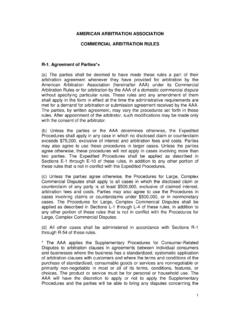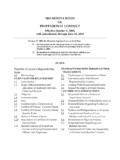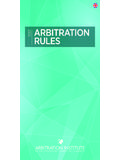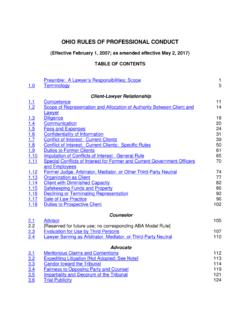Transcription of The standard of Independence and Impartiality for ...
1 The standard of Independence and Impartiality for arbitrators in international Arbitration A comparative study between the standards of the SCC, the ICC, the LCIA and the AAA Master s thesis with internship Procedural Law, 15 hp Author: Helena Jung Mentor: Kaj Hob r Spring semester 2008 Faculty of Law Uppsala University 2 3 Summary One of the most important issues for a prospective arbitrator is to determine whether he meets the standard of Independence and Impartiality as set forth by the arbitration institution overseeing the case. If there are potential conflicts of interest between him and any of the parties to the arbitration, then he must decide whether to decline the appointment or to make a disclosure to the parties. This thesis compares the standards of Independence and Impartiality (1) in recent practices of the SCC and the ICC and (2) in the procedures of the SCC, the ICC, the LCIA and the AAA.
2 The standards of Independence and Impartiality of the SCC and the ICC appear to be similar in their recent practices. Presented in this work are 18 recent decisions regarding neutrality of arbitrators . While the SCC explicitly states that it strives to follow the IBA s guidelines on conflicts of interest, the ICC states that it does not, yet in practice the ICC s decisions seem to resonate with the IBA s guidelines. In situations where a lawyer from a law firm seeks appointment as an independent arbitrator, but the law firm has had previous ties with a party, however remote, the SCC and the ICC institutes require that the lawyer awaits three years from the last contact with the party. Such practice is recommended by the IBA s guidelines. Procedurally, all four arbitral institutes require that the arbitrator disclose any circumstances which may question their Independence .
3 While the ICC, LCIA and the AAA may decide ex officio not to confirm an arbitrator even if none of the parties have raised a challenge against him, the SCC does not decide ex officio. 4 Table of Content 1. 5 Purpose, delimitation and 6 2. Independence and 7 The concepts of Independence and 7 The IBA s 7 3. Challenges to 9 The procedure and the recent practice of the 9 The Swedish Arbitration 10 Challenges under the SCC 11 Case 12 Cases where the SCC rejected the 12 Cases where the SCC sustained the 17 19 The procedure and the recent practice of the 20 Challenges under the ICC 21 Case 23 Cases where the ICC confirmed the arbitrator/ the ICC dismissed the 23 Cases where the ICC did not confirm the arbitrator/ the ICC sustained the 25 26 The procedure of the 27 The procedure of the 28 4. Comparative 31 Do the procedure and the practice of the SCC differ from that of the other arbitration institutes?
4 31 Consequences in international 32 5. Source 5 1. Introduction Background As international law firms grow in size and international arbitration is becoming a more preferred means for resolving dispute, the issue of arbitrator s neutrality is becoming ever more important. The growth may expose a law firm with increasing conflict-of-interest issues since the likelihood of the law firm having had contact with the opposing party increases as the law firm grows. In order to circumvent such conflict of interest issues, larger law firms have been known to adopt drastic measures. There have been many situations where a partner in an international law firm leaves his firm to start a firm of his own in order to avoid conflict-of-interest issues which may prevent him from accepting an appointment as an Recently, a procedural department of one of Stockholm s biggest law firms broke off from the firm to start its own firm in order to avoid situations where its lawyers may have to turn down assignments due to Are such precautions necessary means for avoiding conflict-of-interest issues?
5 This work takes a closer look at how the standards of Independence and Impartiality for arbitrators in international arbitration apply in determining an arbitrator s neutrality. Purpose, delimitation and method This thesis compares the standard of Independence and Impartiality reflected in the procedure of the Arbitration Institute of the Stockholm Chamber of Commerce (hereinafter SCC ) with the standards of the international Chamber of Commerce international Court of Arbitration (hereinafter ICC ), the London Court of international Arbitration (LCIA) and the American Arbitration Association (AAA). The thesis also compares the recent practices of the SCC and the ICC. The recent practices of the LCIA and the AAA are not included since they have not published any decisions on this topic. The scope of the thesis is limited to comparing the procedure and the practice of the ICC, the LCIA and the AAA to those of the SCC.
6 The arbitration acts of jurisdictions other than Sweden will not be addressed. 1 Lawson, p. 37. 2 Dagens Juridik, 2008-01-16, (2008-05-28) 6 Conventional legal sources are used within the framework of this thesis. In instances where source references are missing, the author relies on the information garnered from her work experience as a legal counsel of the SCC. Disposition The thesis starts with a discussion of the concept of Independence and Impartiality and a description of the guidelines on conflicts of interest in international arbitration published by the international Bar Association (IBA) in 2004. Thereafter, the procedure and the recent practice of the SCC are offered, followed by the procedure and the recent practice of the ICC and the procedures of the LCIA and the AAA. This thesis compares the standards of Independence and Impartiality (1) in recent practices of the SCC and the ICC and (2) in the procedures of the SCC, the ICC, the LCIA and the AAA.
7 Finally, thesis is concluded with a summary of the main points of interest in the comparison. 7 2. Independence and Impartiality The concept of Independence and Impartiality Numerous terms have been used to describe the neutrality of an international arbitrator. Most frequently the UN s Universal Declaration is quoted, saying that an arbitrator must be independent and Independence is traditionally defined as freedom from authorities. In international arbitration, however, the term is more frequently used to describe the arbitrator s lack of ties to any of the parties, counsels or In both civil- and common-law jurisdictions there is an accepted requirement that an arbitrator must be independent both towards the parties involved and the authorities and also be perceived as independent. It is no small matter that arbitrators must have the confidence of their prospective clients, the business Therefore, it is reasonable that an arbitrator must not only be independent but also in the eyes of a neutral third party be perceived as independent.
8 The term impartial usually describes an arbitrator s state of mind. To be impartial, an arbitrator should not be biased towards any of the parties or their counsel. As it may be difficult from the facts to conclude whether an arbitrator is impartial, it is often considered a demonstration of Impartiality to be Now a brief description of the IBA s guidelines will follow, giving one view on what may call into question an arbitrator s Independence and Impartiality . The IBA s guidelines The IBA recognised the growing number of problems caused by conflicts of interest in international arbitration. In an effort to minimize unnecessary disclosures and withdrawals by arbitrators they put together a group of experts from around the world to compose guidelines on conflicts of interest in international The purpose of the guidelines was stated to be harmonisation of the standard of Independence and Impartiality in international 3 Lawson, p.
9 23. 4 Lawson, p. 39-40. 5 Lawson, p. 24-25. 6 See for example Swedish Govt. Bill 1998/99:35, p. 82. 7 Introduction to the IBA Guidelines on Conflicts of Interest in international Arbitration, p. 3-4. 8 Introduction to the IBA Guidelines on Conflicts of Interest in international Arbitration, p. 4. 8 The guidelines are constructed in two parts. The first part consists of general standards expressing the principles that should guide arbitrators , parties and arbitral institutions when deliberating over possible bias. The second part consists of a list of specific situations meant to give practical guidance. The list is divided into three parts: a red list, an orange list and a green list. The red list describes situations in which an arbitrator should not accept appointment, or withdraw if already appointed. The guidelines deem certain situations described in the red list as non-waivable, such as when there is an identity between a party and the arbitrator, or the arbitrator has a significant financial interest in one of the parties or the outcome of the case.
10 The orange list is a non-exhaustive enumeration of specific situations, which, in the eyes of the parties may give rise to justifiable doubts as to the arbitrator s Impartiality or Independence . According to the guidelines the arbitrator has a duty to disclose situations falling under the orange list. In situations on the orange list, the parties are deemed to have accepted the arbitrator if, after disclosure, no timely objection is made. The IBA general standard suggests a time limit of 30 days for parties to raise objections. Such situations include previous services for one of the parties within the past three years and relationships between an arbitrator and a co-arbitrator or counsel. The green list describes situations in which the guidelines do not recommend disclosure let alone withdrawal by the arbitrator. These situations include previously expressed legal opinions and previous services by the arbitrator s law firm against one party in an unrelated matter without the involvement of the arbitrator.








